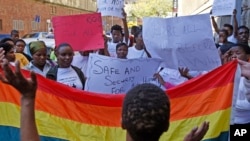The Office of the U.N. High Commissioner for Human Rights said it is concerned by developments in Malawi that could stoke anti-gay sentiment, including incitement to murder. It expressed fears the decision by Malawi’s chief prosecutor to drop charges against an individual accused of inflammatory statements against gays and lesbians could have serious consequences.
Earlier this month, the spokesman of one of the country’s main political parties publicly, and on several occasions, described gay and lesbian people as “worse than dogs” and called for them to be killed.
A criminal case was subsequently lodged against People’s Party spokesman Kenneth Msonda by two civil society organizations, charging him with inciting others to break the law.
But, U.N. Human Rights spokesman Rupert Colville says the director of public prosecutions decided to discontinue the case on Thursday, one day before Msonda was due to appear before the Blantyre Magistrate Court.
“We are concerned that the failure to prosecute this case sends a dangerous message that inciting others to kill gay people is legitimate and will be tolerated by the authorities—in effect encouraging violent threats and attacks on the gay and lesbian community in Malawi," said Colville.
Malawi has laws criminalizing consensual same-sex activity by adults. But Colville tells VOA the government has been effectively observing a moratorium on the arrest and prosecution of individuals on charges related to homosexuality since 2012.
“It is still on the books, but they have not been practicing it," said Colville. "But, in a sense, this case is completely different. This is incitement to kill and irrespective of for what reason, that is against the law in Malawi. Killing is against the law.”
Human Rights organizations report 79 countries criminalize homosexual activities — 34 are in Africa. They say 10 nations with large Muslim populations, among them four in Africa, have laws providing for the death penalty for same-sex intimacy.





